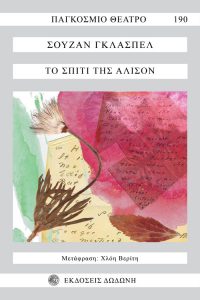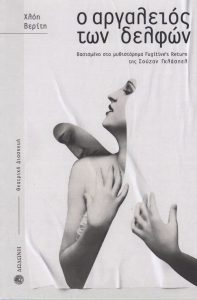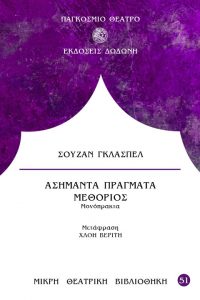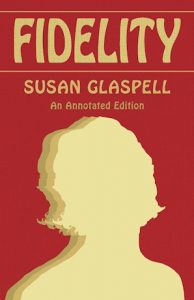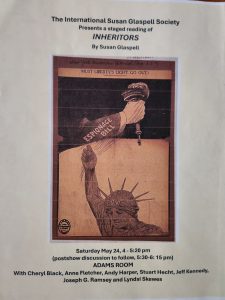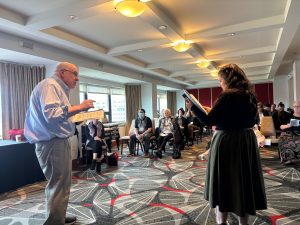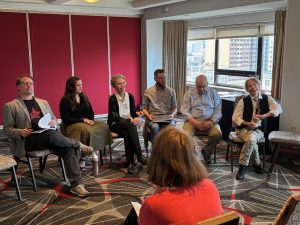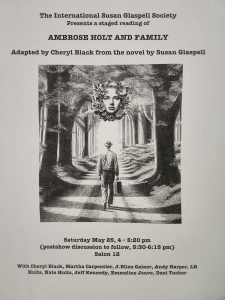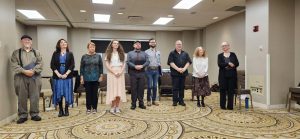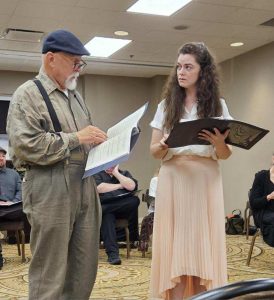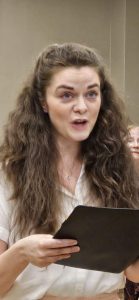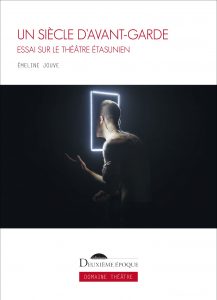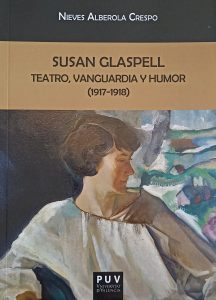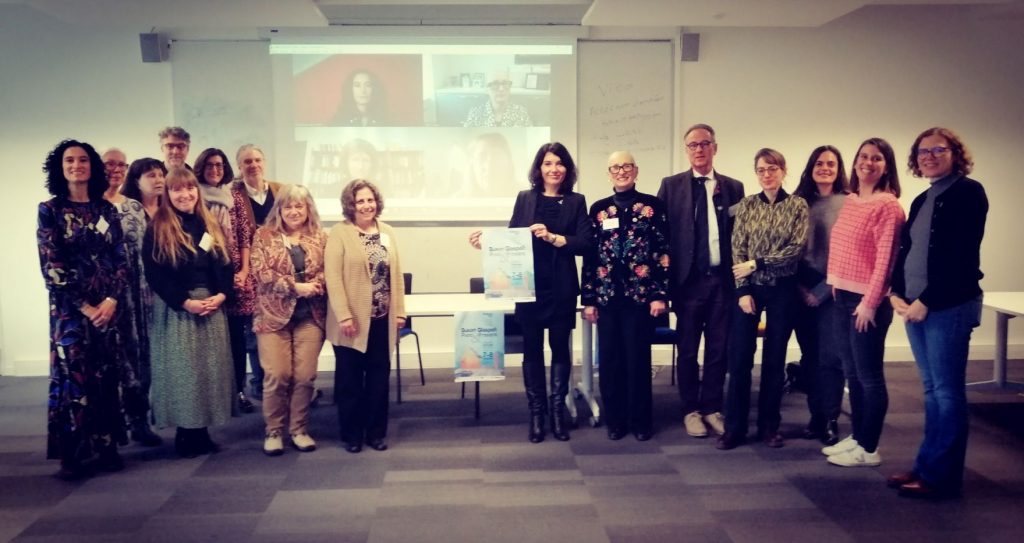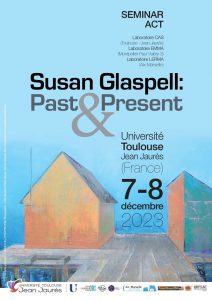Our dear friend and the German translator of Susan Glaspell’s short stories, Henning Bochert, tells a delightful story here of literary detective work. He published it in German on TraLaLit but he feels it really needs to reach an American audience. We agree and it is presented below, slightly excerpted:
As a literary translator, I occasionally find myself in the privileged position to develop my own projects. I follow inspiring traces, and sometimes my search turns into something bigger. That happened with Susan Glaspell. In spring 2022, I researched the writer’s work at the New York Public Library. The modernist classic is hardly known in Germany due to a lack of translations. I had not known her myself – until the International Susan Glaspell Society asked me to check a translation of one of her stories. A grant from the German Translators Fund helped me out of my ignorance. Now I have introduced this author to German-language audiences. [. . .]
In April 2022, I spend two weeks in New York City to visit the Berg Collection at the New York Public Library, where much of the material of and on Glaspell and her husband is stored. I find letters, the manuscript for a speech, and drafts, maybe of an unwritten story. Careful browsing through the documents that are brought to me upon request, and reading notes in her handwriting brings me closer to the writer. In the NYPL’s catalogue, I also find her story The Anarchist – His Dog, and I hope for once to come across a manuscript or original material. This book, however, is kept in a different part of the building. To get to it, I need to cross the hall and walk through both large public reading rooms to reach the George Arents Collection.
The young librarian is a good-humored, enthusiastic man who produces the story that I had reserved in advance from a backroom. I am asked to make myself comfortable at one of the long reading tables. Shortly after, the man approaches me, carefully placing the requested item on the surface in front of me. 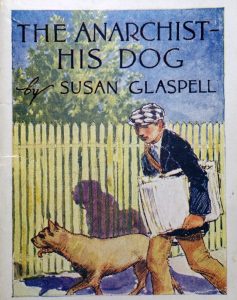 It turns out to be a tiny booklet, about the size of a matchbox. The cardboard cover illustration displays the face of a boy. I already know the story, so I also know that this is Stubby, the protagonist.
It turns out to be a tiny booklet, about the size of a matchbox. The cardboard cover illustration displays the face of a boy. I already know the story, so I also know that this is Stubby, the protagonist.
The story: Stubby, the child of poor parents, has to earn money as a paper boy. He and the other boys have to get up very early to get their newspapers and ride their bikes along their routes so the subscribers can read the paper at their breakfast table. All the boys are not only followed by dogs along their routes but most of them have their own dogs to keep them company. Not so Stubby. But at some point, a stray dog finds him.
He keeps him, they become very close friends. And a friend is exactly what Stubby needs. It is therefore particularly callous when the newspaper-reading father warns his boy that there is an annual dog tax of two dollars. If you fail to pay that, the dog will be taken away from you. Confronted with these brutal realities, Stubby is shellshocked. After difficult days of inner conflict, he decides to earn the money for the dog tax himself, and secretly at that, because he is supposed to hand over every cent he earns to his parents. Despite his greatest efforts, he is unable to gather the required amount.
Finally, Stubby learns, from his father, something about anarchists. These are people, his father explains, who are against the law and shoot policemen. Right away, Stubby recognizes himself in this description. He will have to kill the policeman who will take his dog. But being a good boy, Stubby writes a letter to the officer warning him that he will have to kill the policemen if he were indeed to take his dog away from him. And it would not be a Glaspell story if the ending would not have a surprise twist to it.
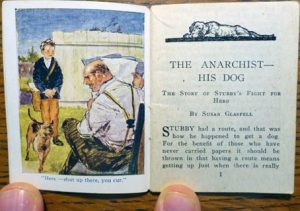
Susan Glaspell wrote that story in 1914. Like many of her narrations, it could be used as a model for the composition of a short story, and I presume that that has already been done. In Dem Anarchisten sein Hund, which will later be the title of my German translation, Glaspell mobilizes her rich arsenal of empathy and humor. The plot moves around the young protagonist and the obstacles he has to overcome. But I wonder, why does Glaspell write about anarchists, of all people? Oftentimes, she wrote her stories inspired by real events. By strict parental and then legal domination, the boy finds himself hard pressed for radical measures. (She plays with this trope in a very different manner in her story A Matter of Gesture, which is not funny at all.)
Rereading the passage, I find that the young protagonist overhears this expression from his father who reads it in his newspaper. What kind of newspaper, I wonder, will that destitute man read in his small home in the United States in the early years of the 20th century? Is it a workers’ paper? And what will it say about anarchists? Regarding acts of violence against the state: If the story takes place in the year of its publication, it could refer to the assassination attempt by Gavrilo Princip on the heir presumptive to the throne of the Austro-Hungarian Empire, Franz Ferdinand, and his wife Sophie Chotek, duchess of Hohenberg, in Sarajevo. Princip, however, a member or stooge of the nationalist, pro-Serbian, secret terror league Black Hand, was anything but an anarchist. It is, of course, a different matter what American newspapers would make of this.
More likely is that Glaspell refers to the history of the anarchist movement in the US that had been creating a spectacular stir during the thirty years before, at the latest with the Haymarket events in Chicago on 1 May 1886. Here I stumble upon an exciting, almost forgotten story. I realize that the beginning of the labor movement in the US overlapped with Glaspell’s adult years. The radical left labor movement in the US and Susan Keating Glaspell practically grew up together. Glaspell was familiar with these circles – the broad community with its many radical, German language magazines and papers, bearing iconic names like Freiheit (Most, London), Die Autonomie, Der Vorbote, Die Fackel, Freie Arbeiter Stimme (in Yiddish), Die freie Gesellschaft (also in Yiddish) and many more, which is of special interest when translating Glaspell’s stories into German. But how does this story end up in the Arents Collection? And why the hell did it appear in this droll format?
After having dealt with the good piece of prose intensely, I pry into the librarian with question he answers very willingly and in detail. In 1914, Winthrop Press in New York prints a collection of thirty-three of the best short stories of the time for the American Tobacco Company. Apparently, there were plans to publish one hundred texts but, in the end, there were only thirty-three. Which is not bad either. The library catalogue offers plenty of information on this campaign: the story is listed here as part of the item with the catalogue number S 1851, the American Tobacco Company being tagged as additional author. Each individual booklet is listed as “Arents S 1751 no [1-33]”, The Anarchist – His Dog being number 13. “31 pages, collector’s item, 71×55 mm.” The American Tobacco Company had it printed in a special edition in the form of these miniature books. But why? The knowledgeable librarian enlightens me: they were packed with cigarette boxes of the Egyptienne Straights, Omar, and Sovereign brands as well as with the Piccadilly Little Cigars as premiums.
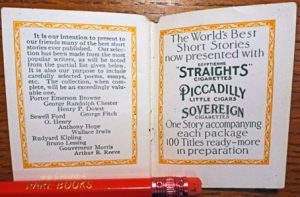
I imagine how the chain-smoking advertisement makers à la Mad Men became increasingly bored with the collectors cards of famous baseball players (listed in the American Card Catalogue of the library as well), and of the nice little satin flags that were packed with the Egyptienne Straights for a while; how they sat around their vast office space, smoking, and could not think of convincing ideas for new advertising campaigns and therefore picked up a paper or something in writing lying around to take their mind off the task, and how they felt good about being distracted like that. Apparently, smoking-while-reading was a common thing. There is even a great essay by George Orwell from 1946, entitled Books vs. Cigarettes. [. . .] To have the tobacco industry, never shy about implementing offensive strategies to create addiction in order to raise their profit, propagate reading-while-smoking, is, in its subtle shift of accent, an admittedly original idea.
The young man behind the counter sees me impressed and lets his words briefly sink in. Then, with a “please wait one more second”, he disappears in the back again. When he returns, he presents, adequately proud, a box containing the entire collection, the full series of these booklets, among which I see, despite the small print, many classics at first glance: Rudyard Kipling’s The Taking of Lungtungpen, Edgar Allan Poe’s A Cask of Amontillado, O. Henry with The Ethics of Pig. The Headless Hottentot by Jerome Beatty makes me curious. Among the few women (the other being Olive Mary Briggs), Glaspell is represented even twice, because number 12 in the catalogue is the story According to His Lights, a title I do not know yet. The librarian’s colleague, the competent man explains, had custom-made these three cardboard boxes and their stylish sleeve to store the thirty-three specimens, eleven a piece.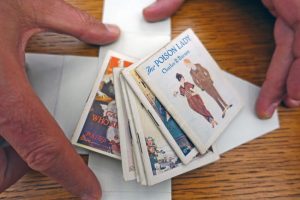
I agree, it is a stout collection, and quite remarkable, both the collection and the boxes. So much beautiful literature that had to be well-known and slim in stature, too, gathered in such compact space, is a charming gem of the Arents Collection and allows for enlightening insight into an era long gone by, when the delight of consuming highly carcinogenic neurotoxins could be coupled with publicly laudable pleasures. [. . .] I am deeply astounded by the attempt to make a tar lung appear appealing to people by virtue of high-caliber literature – that is undoubtedly a remarkable marketing success.
Thank you, Henning! Many of us have had our moments of revelation in the Berg Collection at The New York Public Library, but this is quite a find!
To access the full text, see Henning’s website:
Books and Cigarettes

